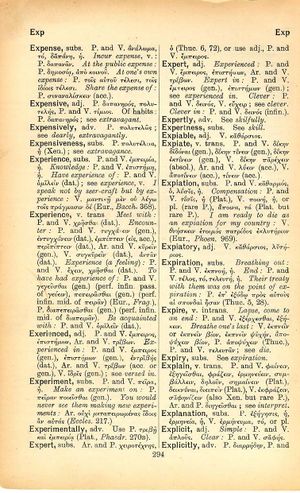expire: Difference between revisions
From LSJ
ποντίων τε κυμάτων άνήριθμον γέλασμα, παμμῆτόρ τε γῆ (Aeschylus' Prometheus Bound l. 90) → O infinite laughter of the waves of ocean, O universal mother Earth
(CSV4) |
m (Woodhouse1 replacement) |
||
| Line 1: | Line 1: | ||
{{Woodhouse1 | {{Woodhouse1 | ||
|Text=[[File:woodhouse_294.jpg|thumb|link={{filepath:woodhouse_294.jpg}}]] | |Text=[[File:woodhouse_294.jpg|thumb|link={{filepath:woodhouse_294.jpg}}]] | ||
===verb intransitive=== | |||
[[lapse]], [[come to an end]]: [[prose|P.]] and [[verse|V.]] [[ἐξέρχομαι]], [[ἐξέρχεσθαι]], [[ἐξήκειν]]. | |||
[[breathe one's last]]: [[verse|V.]] [[ἐκπνεῖν]] or [[ἐκπνεῖν βίον]], [[ἐκπνεῖν ψυχήν]], [[ἀποψύχειν βίον]], [[prose|P.]] [[ἀποψύχειν]] ([[Thucydides|Thuc.]]), [[prose|P.]] and [[verse|V.]] [[τελευτᾶν]]; see [[die]]. | |||
}} | }} | ||
Revision as of 08:55, 20 May 2020
English > Greek (Woodhouse)
verb intransitive
lapse, come to an end: P. and V. ἐξέρχομαι, ἐξέρχεσθαι, ἐξήκειν.
breathe one's last: V. ἐκπνεῖν or ἐκπνεῖν βίον, ἐκπνεῖν ψυχήν, ἀποψύχειν βίον, P. ἀποψύχειν (Thuc.), P. and V. τελευτᾶν; see die.

